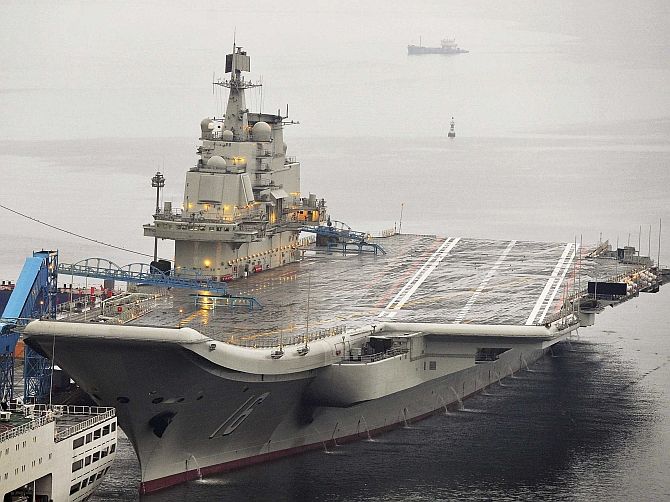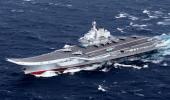
China on Tuesday launched its second aircraft carrier from a key base in the South China Sea, boosting its military ambition in the region where Beijing's claims of sovereignty is challenged by the United States and other nations.
The ship named after Shandong Province in east China was launched from Sanya, located in the South China Sea coast by President Xi Jinping, who is also the General Secretary of the ruling Communist Party of China (CPC) and head of the country's military.
The aircraft carrier is China first domestically-built ship.
China currently has one aircraft carrier Liaoning, a re-fit of the Soviet era ship which was commissioned in 2012.
It is largely used for training, specially to test the fighter jet J-15, which has been specifically developed to operate from the decks of the aircraft carriers.
Official media reports said Shandong with displacement of around 40,000-60,000 tonnes is bigger than Liaoning and could house 36 fighter jets compared to 24 by Liaoning besides helicopters.
Even while Shandong was undergoing sea trials, the media reports here said China is feverishly building a third carrier which is projected to be even bigger with displacement of 80,000 tonnes.
A recent media report which displayed satellite photos said China has established a huge aircraft carrier factory in Shanghai to produce several huge ships.
China plans to acquire about five to six aircraft carriers in the coming years, according to reports in the official media.
The fast-paced construction of aircraft carriers by China has strategic significance for India too.
Though the Indian Navy has been operating aircraft carriers for decades, it currently has one aircraft carrier, INS Vikramaditya in operation.
The second carrier, INS Vikrant is under construction at Kochi and expected to enter service in 2022.
As it built more aircraft carriers, China, which already has a base at Djibouti in the Indian Ocean is stepping up its presence in India's backyard.
China has also acquired the Hambantota port in Sri Lanka on as a debt swap for 99 years.
In a major rejig of its military doctrine, China since 2013 stepped up the development of the Navy with massive budget.
It included building several aircraft carriers besides submarines, frigates and assault ships as part of its efforts to expand its global influence.
Shandong would be deployed in the South China Sea, the state-run Global Times reported.
According to Chinese naval officials Shandong's presence in the South China Sea could be a deterrent for repeated forays by US naval ships to assert freedom of navigation in the area.
China's claims almost all of the South China Sea. Vietnam, the Philippines, Malaysia, Brunei and Taiwan have counter claims.
Shandong's e commissioning marked China's entry into an age of double carriers, an achievement only a few countries in the world have accomplished and will enrich the Navy's tactical and strategic choices in time, space and sheer power, Global Times quoted Chinese experts as saying.
The conventional-powered Shandong is equipped with more advanced electronic devices and control and command system, and built with an optimised superstructure and internal layout, after gaining actual-use experiences following Liaoning's commissioning, the analysts said.
During Tuesday's launching ceremony, Xi presented a PLA flag and the naming certificate to the captain and political commissar of the Shandong, respectively.
He later boarded the ship during which he was presented a guard of honour.
The second aircraft carrier based in the south can effectively patrol the South China Sea, protect islands and reefs there and act as a strategic foothold at sea, Beijing-based military analyst Wei Dongxu told the Global Times.
While the Liaoning could go from the East China Sea to the Pacific Ocean and train more pilots and officers, Shandong could sail from the South China Sea into the Pacific Ocean and even go to the Indian Ocean, Wei said.
One carrier could also stay near the mainland for alert missions, while the other could sail farther away into high seas for long-range missions, analysts said.
Together with escorting guided missile destroyers as well as submarines and supplemental ships, the aircraft carriers could provide formidable power that China did not have in the past, a Chinese expert told the daily.
As it builds a number of aircraft carriers at a feverish pace, China has stepped up programme to train pilots for the newly developed carrier fighter jet J-15 as well as to command warships.
The People's Liberation Army (PLA) Navy is training jet fighter pilots to sail and command warships, a move that aims to create more capable commanding officers for aircraft carriers, a recent media report said.










